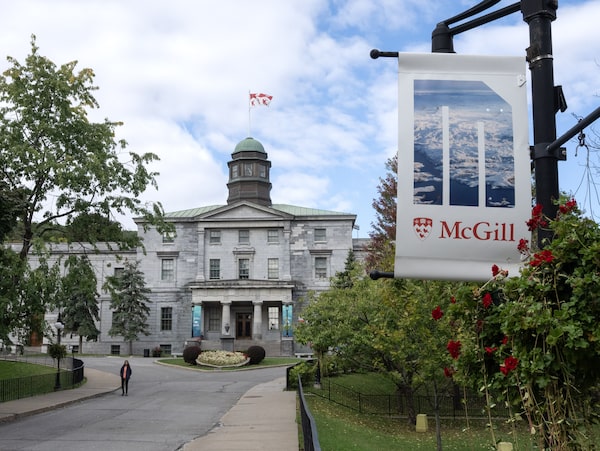
The McGill University campus in Montreal in October, 2023.Ryan Remiorz/The Canadian Press
McGill University will offer scholarships to Canadian students from outside Quebec to cover the cost of the tuition increase the Quebec government plans to impose next year.
The newly created Canada Award scholarships would be worth $3,000 annually, guaranteed for four years, starting in the fall of 2024 or winter of 2025, and funded by the school, McGill said Tuesday.
Roughly 80 per cent of incoming students from the rest of Canada would receive the funds, which would go to students in arts, agricultural and environmental sciences, music, education, architecture, nursing and most programs in science.
The intention is to offset the difference between the university’s current out-of-province tuition price, about $9,000, and the $12,000 price named by the Quebec government last week.
Fabrice Labeau, McGill’s deputy provost, said it’s important to send a message to prospective students that they are still welcome, despite the challenges being thrown out by the Quebec government.
McGill is already facing difficult financial choices, he said, but funding this initiative is a priority.
“Not having students from the rest of Canada at McGill is basically changing the DNA of what our university is,” Prof. Labeau said. “From our perspective, we’re deploying a student aid mechanism to try to offset the harm that the measures are going to do to our university and to students from the rest of Canada.”
Pascale Déry, Quebec’s Higher Education Minister, announced in a letter to the heads of the province’s three English universities last Thursday that the government will move ahead with plans to increase tuition fees at McGill and Concordia universities for students from the rest of Canada. She also announced that 80 per cent of students at Quebec’s English universities would have to achieve an intermediate level of French fluency by the time they graduate.
Valérie Chamula, chief of staff to Ms. Déry, said McGill is free to award scholarships to its students from its own funds, but the minister hopes to be able to count on the university’s collaboration in implementing the announced policies.
Ms. Déry has said the government’s moves are necessary to protect the primacy of the French language, particularly in Montreal, and to rebalance funding levels between English and French institutions. McGill and Concordia, which have already seen 20-per-cent drops in their application numbers, said the tuition fee increase would make it difficult to compete with universities in Ontario or British Columbia, where fees for many programs are closer to $6,500 annually.
The two universities would also lose money from a proposed clawback of international student tuition, which would be redistributed among the province’s other universities. Bishop’s University, which is located in Lennoxville, was granted an exemption from the out-of-province tuition increase for up to 825 students because the government said the primacy of the French language is not threatened in the Eastern Townships region.
Prof. Labeau said McGill is still forecasting revenue losses of between $42-million and $94-million annually as a result of the government’s plans, which has already led to a hiring freeze. Finding the funds to pay for the new scholarships will require “targeted budget cuts,” he added.
“The idea is to reallocate some of our funds to make this happen,” Prof. Labeau said. “When we’re facing potential losses in revenue that are up to 10 per cent of our operating budget, I don’t think we can afford a lot of things. But we have to set our priorities.”
If McGill doesn’t act, Prof. Labeau said, it will be priced out of the market in disciplines where it typically attracts students from the rest of Canada.
“Our mission is to educate the best talent from anywhere in the world. If we lose that we are not McGill any more,” he added.
The French fluency requirements will not apply to the fall 2024 incoming class. About 1,500 students enter their first year at McGill from other Canadian provinces every year, Prof. Labeau said. Roughly half the university’s students are from Quebec, 30 per cent are from abroad and about 20 per cent are from the rest of Canada.
McGill principal Deep Saini said in a statement that although the scholarships will require sacrifices on the university’s part, attracting a diverse student body makes for a richer learning environment.
Last week Dr. Saini called the government’s decision to move ahead with the tuition increase and French fluency requirements a “targeted attack” on the province’s English universities. He said the move would tarnish Montreal’s reputation and harm the Quebec economy.
In November, in an attempt to avert an even larger tuition hike, the English universities went to government with a proposal to get 40 per cent of their graduates to a certain level of French fluency by the time they graduate.
The Quebec government thanked the universities for recognizing the threat to the French language in Montreal and raised the stakes by increasing the objective to 80 per cent of graduates with an intermediate level of French. Dr. Saini has said government officials indicated there would be financial penalties if results fell short, but the government has not made such details public.
McGill and Concordia have said it would be academically impossible to achieve that result without derailing the curriculum or asking students to study for an additional term.
 Joe Friesen
Joe Friesen